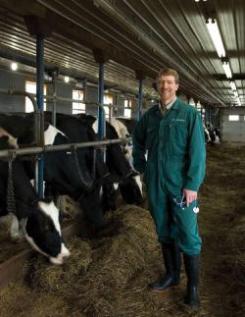
“I conduct research associated with the non-governmental organization called Farmers Helping Farmers”, says John VanLeeuwen, a Professor of Epidemiology and Ruminant Health Management at AVC.
VanLeeuwen is president of the farmers’ aid group. It’s an award-winning organization of community-minded PEI people with agricultural backgrounds whose goal is to directly assist Kenyan farmers in boosting their food production and quality of life.
Each year for the past five years, he has worked with a dairy farmer co-op in Kenya “to help them fight disease in their cattle and increase milk production and other measures of productivity. The research varies from baseline epidemiological surveys of current status, to evaluation of benefits of our actions, to clinical trials to determine efficacy of new product applications. What is novel is that we have incorporated our research within the context of a development project in collaboration with small non-governmental organizations in PEI and Kenya.
The co-op has approximately five to six thousand Kenyan farmers, located in a mountainous area on the slopes of Mount Kenya. “Each of the farms is small, one to five acres perhaps, and has maybe one, two, or three cows. It used to be a coffee-farming area but the crop was contributing to soil erosion so the grass needed for the cattle has helped to stabilize the soil. We’ve shown that we’ve increased the number of adult animals and the number of calves. We also reduced the number of udder infections and improved parasite control, all leading to more milk production. And the farmers are now much more knowledgeable on health management of dairy cattle. Soon, we’re going to look at the frequency of pregnancy losses in the cattle, determine the infectious causes, and try to figure out why certain animals and farms are more susceptible to those infectious causes.”
VanLeeuwen has several research papers under way arising out of his work in Kenya, but he also sees more intangible benefits including families being able to send their children to school because of income derived from healthier cows.
VanLeeuwen’s work has been recognized with a 2007 Pfizer Research Excellence Award and, the year before, the Stewart MacDonald Health Research Excellence Award.
“In Canada, my cattle research includes infectious diseases, udder infections, and test evaluation. And, of course, I’m asked to assist in other research projects as an epidemiologist, so I learn about other areas outside my primary interest, such as fish diseases, avian influenza in poultry, worms in sheep, even pregnancy tests in dogs.”
Working with AVC’s Greg Keefe and Ian Dohoo, VanLeeuwen is the director of a national project testing for four particular pathogens in dairy cattle: Johne’s disease, neosporosis, leukosis, and bovine viral diarrhea. “We wanted to find out how common they were at both the animal and the herd level, and then find out the impact of being infected. There are milk production effects, mastitis effects, reproduction effects, and culling effects. We could then figure out the economic costs associated with them. And, from a disease prevention perspective, it is important for us to determine what factors are contributing to animals or farms becoming infected.” Anywhere from 40 to 80 per cent of herds in Canada have one or more of these diseases. Interest in controlling these diseases is increasing in Canada as a result of these findings.
“Now we’re looking at prevention strategies, including one interesting proposal to examine use of monensin on farms. In the national study, farms that used monensin, which displays antimicrobial properties, had lower infection levels with Neospora than those that didn’t. So a new study testing monensin, to begin this year, might end up being a bit of a Eureka moment.
“Because my PhD was in agricultural ecosystems, I am interested in looking at the larger scale as well, beyond the farm, so I started investigating nitrates in groundwater across PEI—sources, reduction methods, and whether levels are getting better or worse.”
He is also involved with another project with colleagues at Guelph. “It fits well with the agricultural ecosystem line of research, but also infectious diseases. We’re primarily looking at organic sheep farms and doing a descriptive study of intestinal parasitism to see if such farms fare better or worse than conventional farms, and determine the farm and animal risk factors of high parasitism.”
In addition to his research projects, VanLeeuwen dedicates considerable time to many leadership roles with various research organizations. He is also the AVC faculty liaison for Veterinarians Without Borders in Canada. The organization, which is less than three years old in Canada, works with people in need to foster the health of animals, people, and the environment.
So how did a kid from a farm in Ontario become a veterinarian with a global perspective? “I have an uncle who is deeply involved with development in the Philippines. And once I had some clinical experience, in large animal practice in Nova Scotia, I had the opportunity to get both my MSc and PhD and utilize that background. My master’s degree spun out of an International Development Diploma involving work in Costa Rica on cow, farm, and ecological risk factors of a particular virus that affects cows—similar to foot and mouth disease—called vesicular stomatitis. And my doctorate was on agricultural ecosystems and health. It all just seems to fit together.”